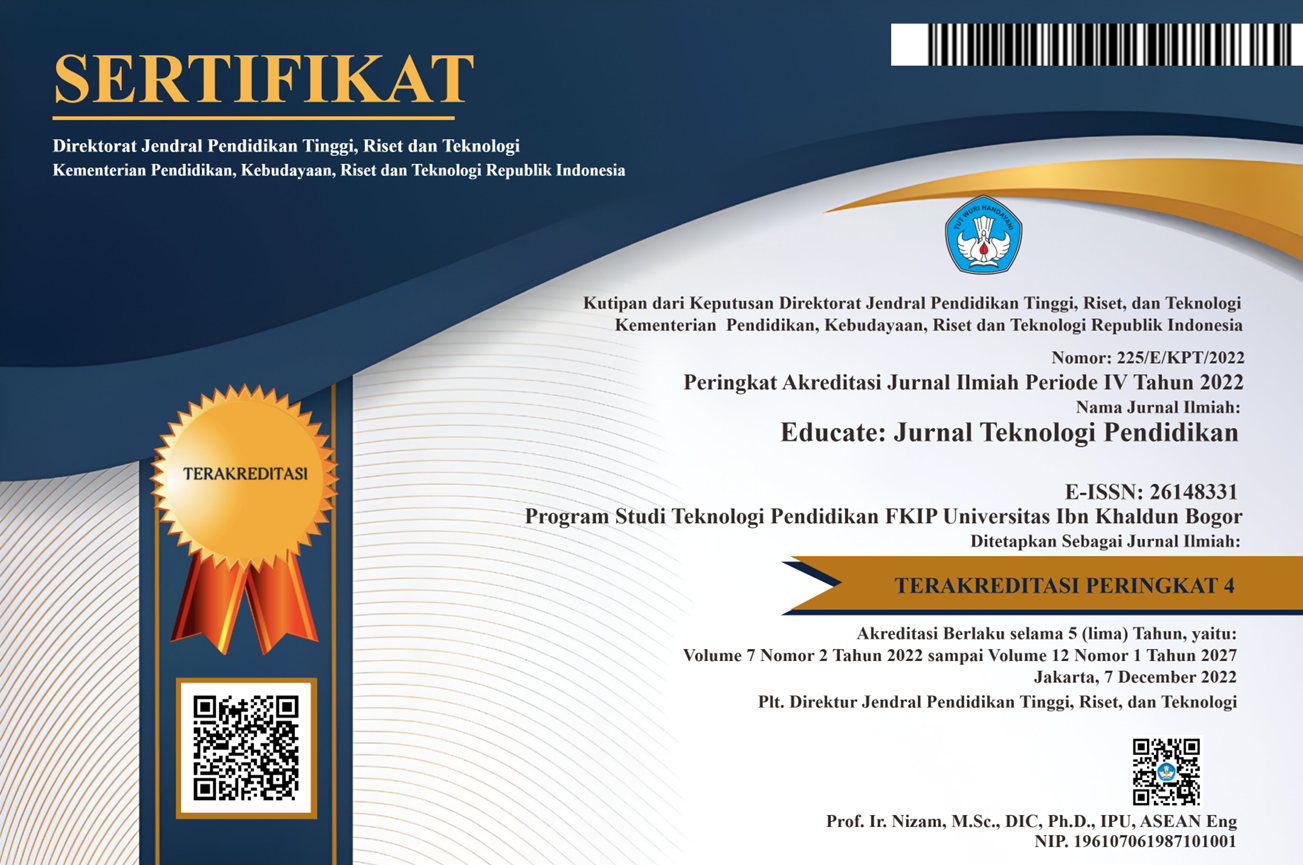DEVELOPMENT OF MOSQUE ORGANIZATIONS AS LEARNING ORGANIZATIONS IN THE PERSPECTIVE OF MARQUARDT'S THEORY
DOI:
https://doi.org/10.32832/educate.v10i1.18396Keywords:
Mosque, Learning Organization, Mosque Organization, System Learning Organization ModelAbstract
Currently, there is an interesting phenomenon related to the development and enthusiasm for prospering mosques in Indonesia. Not only related to the development of their numbers, the development of their building designs, but also related to the development of their organizations and management. The current trend in mosque management shows more professional mosque management, mosques are no longer just places of prayer, but many mosque organizations are trying to restore the function of mosques as in the time of the Prophet Muhammad SAW, as a place of worship that can also play a role and function as a place of education and social community. This research was conducted using a qualitative research method with a literature review approach or with a library research type. This research utilizes literature (library) in the form of journals, proceedings, and books. The main focus of this research is to analyze and describe how to develop mosque management into a learning organization from the perspective of Marquardt's theory, namely a systems learning organization model that includes learning, organization, humans, knowledge, and technology. From various information related to the profile, programs, and activities of mosques in Indonesia, it can be seen that many mosques have become learning organizations. Marquardt's theory on the learning organization system model can be a framework for mosque organizations in developing mosques as learning organizations whose members have a strong and collective desire to learn continuously to improve themselves and their organization for mutual success.
References
Ahlan. (2022). Peran Masjid Sebagai Basis Peradaban Islam. Jurnal Kajian Islam Interdisipliner, 2(2), 154–165. http://riset.unisma.ac.id/index.php/natiq/article/view/16066DOI:http://dx.doi.org/an-natiq.v2i2.16066
Antara.com. (2020). Ketum DMI Jusuf Kalla: Jumlah masjid Indonesia terbanyak di dunia - ANTARA News. Antara.Com. https://www.antaranews.com/berita/1323622/ketum-dmi-jusuf-kalla-jumlah-masjid-indonesia-terbanyak-di-dunia
Badan Kesejahteraan Masjid (BKM) Pusat. (2000). Fiqih Masjid. Badan Kesejahteraan Masjid (BKM) Pusat, Direktorat Jenderal Bimbingan Masyarakat Islam dan Urusan Haji.
Barus, N. (2021). Transformasi PPSDM Aparatur Perhubungan Menuju Corporate University. Jurnal Ilmiah Edunomika.
BPKRMI Sulsel. (2024, November 25). GERMAS Diluncurkan di Makassar, Pilot Project Nasional Pengembangan Kewirausahaan Remaja Masjid - BKPRMI Sulawesi Selatan. BPKRMI Sulsel. https://bkprmisulsel.id/germas-diluncurkan-di-makassar-pilot-project-nasional-pengembangan-kewirausahaan-remaja-masjid/
Castrawijaya, C. (2023). Manajemen Masjid : Profesional di Era Digital (A. Ulinnuha & K. Ahmad, Eds.). Amzah.
Fachrudin, F., Arini, I., & Japar, M. (2023). Analisis Penerapan Konsep Organisasi Belajar pada AB Home Education. EDUKASIA: Jurnal Pendidikan Dan Pembelajaran, 4(2), 2829–2836. http://jurnaledukasia.org
Imanuddin, M., Sudarmanto, E., Yulistiyono, A., Hasbi, I., Eka Darmayanti, T., Jubaidah, W., Suharyat, Y., Fatira, M. A., Syahrul, Y., Murti, A. R., & Rakhmawati, I. (2022). Manajemen Masjid. Widina Bhakti Persada Bandung. www.penerbitwidina.com
ISEF. (2020). ISYEFPrenuer Kompetisi - Indonesia Sharia Economic Festival. ISEF. https://isef.co.id/kompetisi-isyefprenuer/
Japar, M., Hermanto, H., Djunaidi, D., & Sukardjo, Moch. (2023). Membangun Sekolah Sebagai Organisasi Belajar. Jurnal Basicedu, 7(1), 698–708. https://doi.org/10.31004/basicedu.v7i1.4238
Marquardt, M. J. (2002). Building the Learning Organization : Mastering the 5 Elements for Corporate Learning (2nd ed.). DAVIES-BLACK PUBLISHING, INC.
MasjidMuslimBillionaire.com. (2024). PROGRAM - Masjid Muslim Billionaire. MasjidMuslimBillionaire.Com. https://masjidmuslimbillionaire.com/program/
MasjidIsmuhuYahya.com. (2024). Baitul Muamalah - Masjid Ismuhu Yahya Pontianak. MasjidIsmuhuYahya.Com. https://masjidismuhuyahya.com/
MasjidJogokariyan.com. (2024). Manajemen Masjid Unggulan - Masjid Jogokariyan Yogyakarta. MasjidJogokariyan.Com. https://masjidjogokariyan.com/
MasjidKapalMunzalan.id. (2024). Pendiri dan Sejarah Singkat - Masjid Kapal Munzalan. https://masjidkapalmunzalan.id/pendiri/
Nata, A. (2021). Peran dan fungsi masjid di Indonesia dalam perspektif pendidikan Islam. Ta’dibuna: Jurnal Pendidikan Islam, 10(3), 414. https://doi.org/10.32832/tadibuna.v10i3.5203
MediaIndonesia.com. (2024, October 25). DMI Luncurkan Program Rumah Wirausaha Masjid. MediaIndonesia.Com. https://mediaindonesia.com/humaniora/712290/dmi-luncurkan-program-rumah-wirausaha-masjid
Prabowo, H. (2017). Ecomasjid: Dari Masjid Makmurkan Bumi (M. Huda & A. Hilabi, Eds.). Yayasan Pesantren Al-Amanah Sempon.
Samad, D., Zaini, H., Hamzah, A., Ruslan, R., Bahar, M., Asmara, E., Kosim, M., Hakim, R., Abadi, Ri., & Welhendri. (2021). Masjid Makmur, Memakmurkan dan Pengembangan Ekosistim Syariah Berbasis Masjid (A. Hamzah, Agusrianto, & Masrial, Eds.). Pimpinan Wilayah Dewan Masjid Indonesia Provinsi Sumatera Barat.
Senge, P. M. (1990). The Fifth Discipline: The Art And Practice Of The Learning Organization. Doubleday Currency.
Senge, P. M. (2012). Schools that learn : a fifth discipline fieldbook for educators, parents, and everyone who cares about education. Nicholas Brealey.
Surat Keputusan Nomor 802 (DJII-802) Tahun 2014 tentang Standar Pembinaan Manajemen Masjid.
Suryawati, E. (2021). Pemberdayaan Masjid Sebagai Pusat Pendidikan Islam. Jurnal Ilmu Pendidikan, 15(02). http://jurnal.staiskutim.ac.id/index.php/namajurnal
Utami, D. A., Ilyas, D., & Zakaria, R. H. (2024). Histori Masjid Sebagai Pusat Pendidikan Islam di Zaman Rasulullah SAW. International Conference on Tradition and Religious Studies. https://proceedings.radenfatah.ac.id/index.php/lc-TiaRS/index
Downloads
Published
How to Cite
Issue
Section
License
Copyright (c) 2025 Mohammad Muhyidin Nurzaelani, Yogi Wiratomo, Muhammad Japar, Dian Herdiati

This work is licensed under a Creative Commons Attribution 4.0 International License.
| Authors grant the journal copyright of the work licensed under CC-BY-SA or The Creative Commons Attribution–ShareAlike License that allows others to share the work with an acknowledgement of the work's authorship and initial publication in this journal. | Penulis memberikan hak cipta karyanya kepada jurnal yang dilisensikan dengan CC-BY-SA or The Creative Commons Attribution–ShareAlike License yang memungkinkan orang lain untuk menggunakan karya dengan pengakuan kepengarangan karya dan publikasi awal dalam jurnal ini. |









